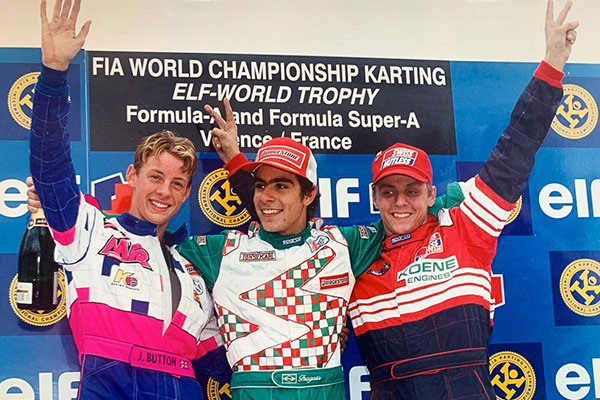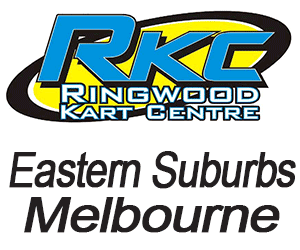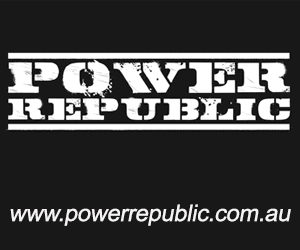from FIA Karting
The name Gastão Fráguas entered the history of international karting during a totally remarkable 1995 season. As a young Brazilian living in Belgium, he seized the opportunity that was presented to him and succeeded in winning the CIK-FIA World Championship in Valence (FRA).
Still passionate about motor sport, he then made a successful career change to driver management, enabling him to share his experience with young drivers by bringing them to Europe to compete against the top specialists.

GASTÃO, CAN YOU START BY RETRACING YOUR KARTING DEBUT?
I started quite late, at 15 years old, after discovering karting thanks to a cousin. It turned out that I had talent and I started out with some success in racing. The following year, in 1993, I tried my luck in Europe at the CIK-FIA World Championship in Laval (FRA) in the Formula A category. I was quite fast, but I was sorely lacking in experience. After a rollover due to a broken brake in one heat, I couldn’t make it to the Final. In 1994, I drove more in Brazil where I crossed paths with Roland Maréchal in a Sudam Championship race. I was impressed by the performance of his team’s Tony Kart chassis. The contact went well and we reached an agreement for me to take part in the World Championship in Cordoba, Argentina. Once again, I had good speed and was able to finish 15th in the final.
HOW DID YOU APPROACH THE 1995 SEASON?
I was determined to take a big step forward. I accepted Roland Maréchal’s offer to come and live in Belgium. It was a major change of scenery away from my family and friends, but the outcome was very positive. I was able to race in several Belgian and Italian Championship races, always in Formula A. The CIK-FIA European Championship got off to a good start with a 2nd place in Lonato (ITA) and I was able to finish 2nd behind Giorgio Pantano after another 2nd place in Salbris (FRA). In the meantime, I was on the third step of the podium at the CIK-FIA World Cup in Suzuka (JPN). I believed in my chances for the CIK-FIA World Championship in Valence (FRA). Everything went well and I took the title ahead of Jenson Button. It really was an extraordinary season at the top of international karting and I don’t regret making the sacrifice of moving to Europe.
WHAT HAPPENED AFTER YOU WON THE WORLD TITLE?
I switched to Formula Super A the following year, but a broken collarbone compromised my season. I was away from the track for two months and I wasn’t ready for the World Championship in Lonato. In 1997, I joined Terry Fullerton’s team alongside Anthony Davidson. It was interesting in terms of equipment development, but complicated in terms of results. That’s when I gradually moved to single-seater racing.
HOW WOULD YOU SUM UP YOUR DRIVING CAREER?
I drove in Formula Renault in 98-99, then in Formula 3 in Brazil in 2000 before hanging up my helmet in 2001. I realized afterwards that I was missing professional management of my career. I wasn’t able to take advantage of the results I’d had in karting. Doors opened, but maybe I didn’t make the right choices. I was thinking back to Jenson Button who finished runner-up in the World Championship in ’95 behind me: he had a well-structured career plan that allowed him to continue successfully in motorsport. That’s what made me want to go over to the other side of the fence and take care of young drivers so that they can develop their talent and create opportunities. That’s why I started my management activity in 2002.
WHICH DRIVERS DID YOU FOLLOW?
Even before I started managing, I had advised my friend Ruben Carrapatoso to come and race in Europe and I made the connection with Roland Maréchal. I am proud to have contributed to the win by a Brazilian of another World Karting Championship in 1998. Closer to home, I took care of Caio Collet from 2014 and encouraged him to come and race in Europe. That’s how he got his place in the official Kosmic team in 2015, led by Olivier Maréchal, to continue the great story I started with his father. Caio immediately took 2nd place in the CIK-FIA European Junior Championship at Portimao, finishing 6th in the standings. He then entered the top 3 of the CIK-FIA World Junior Championship as best rookie.
HOW IS KARTING IN BRAZIL?
In my time, Brazilian karting was at a high level and I was able to race enough to be competitive as soon as I arrived in Europe. But we did not continue to progress afterwards, for several reasons, while Europe was constantly progressing. The gap is now much bigger and it’s difficult for a Brazilian driver coming straight from his home country. There are still good drivers in Brazil, but fewer than before because the standard of competition is lower. It is now essential to come and race in Europe for the big international races, even though it is not cheap.
The organisation of a World Championship in Brazil is a very important event for our country and we are grateful to Felipe Massa for instigating it. This will not happen as planned in 2020 because of COVID-19. We are counting on this event now scheduled for 2021 to revive racing in Brazil and to give a popular boost to karting. I hope that the current situation will not be detrimental to this great initiative.


